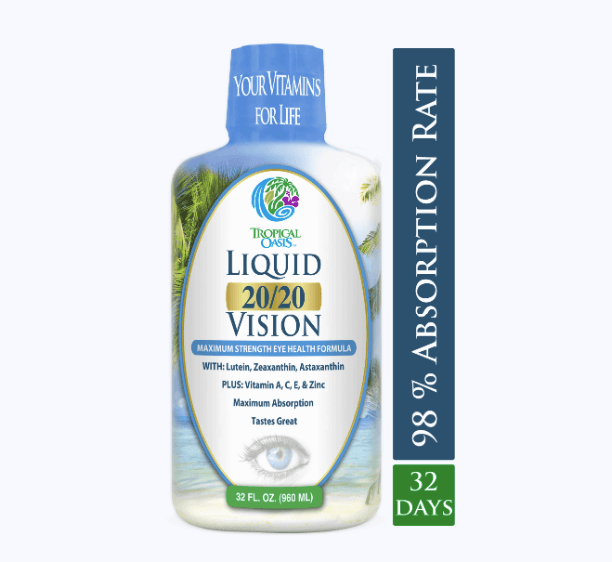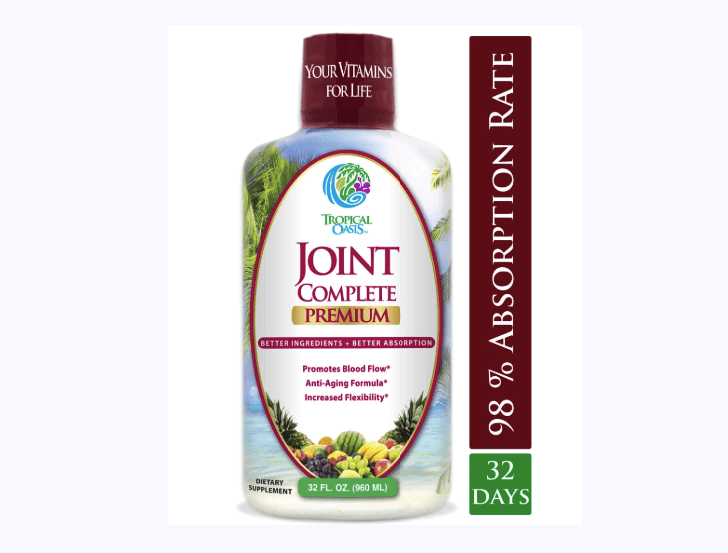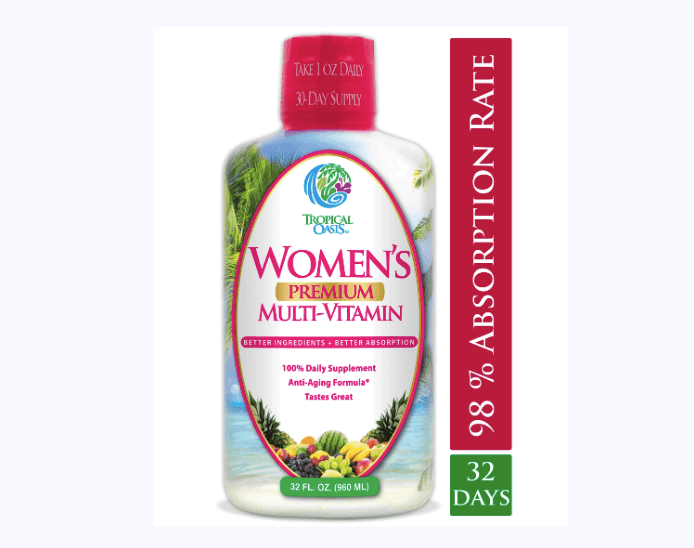Tropical Oasis’ Liquid 20/20 Vision for Eye and Vision Health Can Get You Seeing Well Again

Are you having problems with your vision? Have you noticed your eyesight getting worse as time goes by? If yes, you are probably lacking some life-changing vitamins that will cause drastic changes and make you wish you had tried them sooner. If you are looking to improve your eyesight, we encourage you to check out our Liquid 20/20 Vision vitamin for vision and eye health to help you strengthen your vision within only 1 - 2 months.
Vitamin A for Better Sight
You may have heard that carrots are good for your vision. That’s because they are! Mainly, it’s because they are packed with Vitamin A. Our Liquid 20/20 Vision multivitamin contains a concentrated dose of the essential Vitamin A that your body needs to improve your eyesight for good.
Vitamin A is an antioxidant compound that strengthens and improves the growth of your bones and the health of your immune system. These same antioxidants also help your eye’s mucous membranes and skin. When these are strengthened, they become better protectors against eye infections, diseases, and respiratory problems.
If you are wondering how Vitamin A specifically works to fight for your vision, it contains some specific ingredients that act beneficially for the eyes. Vitamin A has carotenoids, which are a pro-vitamin, converted into retinoids during digestion.
Carotenoids are plant chemicals that work in photosynthesis to help the plant absorb light. We cannot get carotenoids into our bodies without consuming them in our diets. We need them because these antioxidants deactivate free radicals in our bodies. Free radicals are oxygen atoms that can damage cells by reacting negatively to molecules in the body. When your body gets adequate amounts of carotenoids, it uses them to protect the cells in your eyes’ membranes that keep your vision from deteriorating.

Vitamin A Protects Against Macular Degeneration
Studies have shown that Vitamin A combined with lutein can reduce the effects of macular degeneration, which is why we have 20 milligrams of lutein packed into our vitamins for vision and eye health. Macular degeneration is a leading cause of vision loss, due mainly to aging. It happens when the central portion of the retina deteriorates. The retina acts as a camera for your brain. It reflects images and sends them via the optic nerve to your brain. The macula’s position is in the center of your retina. When working properly, the macula collects highly detailed images and sends an accurate picture to your brain. When degeneration happens, the images are blurred and distorted. This causes loss of vision and the ability to accomplish tasks like driving, reading, and even recognizing familiar faces.
Unfortunately, the disease does not yet have a known cure, but as studies have shown, those who take a daily supplement made up of the combination of Vitamin A and lutein, have seen lower effects of macular degeneration over time.
Vitamin A Deficiency Causes Loss of Vision
When your eyes lack Vitamin A, the cornea dries up and becomes cloudy. After time, you develop corneal ulcers and, eventually, blindness. The first indicator of this is night blindness. If you are experiencing night blindness, you should contact a healthcare professional and increase your dose of Vitamin A. Vitamin A deficiency is somewhat uncommon in most developed countries, but it can be dangerous for young children who are picky eaters and do not like to regularly consume vegetables like carrots or sweet potatoes. Consider giving your child a daily shot of liquid vitamins for the eyes.
Benefits of Vitamin C for Your Eyes
Vitamin C is another crucial antioxidant that is included in our 20/20 vision liquid vitamins to help you fight for your healthy eyesight. It is a water-soluble antioxidant that helps your body preserve its connective tissue. In your eyes, this connective tissue is called collagen. Collagen is a protein that essentially holds your body together. It connects your bones, muscles, and skin. Collagen’s makeup is a scaffold, comprised of endogenous collagen (within the body, made by the body) and exogenous collagen (a synthetic substance used for collagen supplements). Exogenous collagen makes up for what your body lacks in endogenous collagen.
Your body needs that extra boost of exogenous collagen when endogenous collagen breaks down and depletes. People take collagen supplements for health conditions like skin disease or degeneration. By including Vitamin C in your daily vision supplement, you give the collagen in your skin extra strength, which guards against health problems like cataracts.
How Vitamin C Fights Cataracts
Many studies have been made that show results of regular Vitamin C intake reducing the risk or level of cataracts. One study showed that women who took a consistent, daily supplement over ten years saw a 64% reduction of the risk of cataracts. At first glance, you may think ten years is a long time to wait to see results, but remember, when you make daily vitamin intake a steady routine in your life, you see lasting advantages that develop and stay for good. You may be tempted to go for a quick fix that provides instant gratification, but if you want changes that are preserved for the long run, you will take the slow and steady, natural route, which is ultimately better for your body.

The Potent Impact of Vitamin E
Combined with Vitamins C and A, Vitamin E works to fortify your retina against macular degeneration and cataract formation. This often underestimated vitamin for eye health contains alpha-tocopherol, which provides neutralizing oxidation. Cataracts are believed to be formed in the lens of the eye, which happens when your eye is exposed to high UV rays of sunlight. The UV rays oxidize the lens, which forms cataracts.
Side Effects of Too Much Vitamin E
Be careful not to take too much Vitamin E. Too much can thin your blood, and eventually cause hemorrhaging problems. This side effect is especially strong if you take blood-thinning medication. You could also have weakness in your thyroid gland function, which would make you fatigued and unable to drive or perform heavy lifting tasks. For this reason, we include just a small dose in our eye health vitamins that works together with Vitamin A and Vitamin C to bring all three valuable components, in just the right proportions, up to their maximum effect on your vision.
Zinc’s Impact on Healthy Vision
Zinc is a mineral that works with Vitamin A and helps your liver to absorb Vitamin A. It brings nutrients from your liver to your retina. Melanin is then produced, which is a protective pigment for the eyes. Impaired vision is often a result of zinc deficiency since zinc directly affects the vascular tissue under your retina. Without sufficient levels of zinc, your eyes will be exposed and vulnerable to infections. Zinc is combined with these other vitamins and minerals in our liquid eye vitamins because it is an invaluable asset to protecting against macular degeneration.
Those who are at high risk, or are already experiencing macular degeneration should take daily supplements of zinc because it can effectively improve their symptoms. It is very difficult to know if you are at risk of macular degeneration since it is sometimes a cause of genetics, but sometimes a cause of unknown factors. If you want to take precautions ahead of time, rather than taking a chance and dealing with the disease later, start taking zinc now as a preventative measure, rather than later, when it is much more complicated to treat. Our bodies do not naturally produce zinc, so it has to be absorbed through diet and supplements.
Zinc is an antioxidant that works with the other vitamins and minerals in our supplement to help enzymes fight free radicals and unwanted organisms from your body.
External Factors That Deplete Zinc Levels
There are a number of causes of zinc depletion. Vegetarians often experience low levels of zinc. It is possible to achieve the amount of zinc you need through a vegetarian diet, but the majority of foods that provide the most zinc are red meats and other animal products. So, if you are a vegetarian, you may want to think seriously about a zinc supplement.
Exercise can also deplete zinc in your body because of sweat. Prolonged exercise causes loss of zinc and iron, especially for long-distance runners or cyclists who exercise outside in the sun rather than inside an air-conditioned gym. After two hours of exercise, you can lose 8-9% of your body’s zinc supply. Since activities like running or cycling are so beneficial to your health in other aspects, do not discontinue these sports, but rather, take a dose of zinc afterward to replenish what you have lost. You can get the right amount of zinc if you take our eye health vitamin combined with foods that also have a good amount.
Ways to Tell if You Are Zinc Deficient
- You could lose or have a decreased appetite, especially for meats like beef and pork
- After or during eating, you may experience nausea or bloating
- You might have trouble sleeping, or develop poor sleep habits
- Zinc deficiency is sometimes a cause of depression
- You may have trouble focusing
- You could experience loss of memory
If you are taking our 20/20 vision vitamins, you will get the right amount of zinc in your body for good vision, but if you are experiencing several of the before mentioned symptoms, try taking an extra zinc supplement. If the symptoms persist, contact a health professional for a consultation.

Zeaxanthin and Lutein Protect Your Eyes from Blue Light
Zeaxanthin is another type of carotenoid. It can be found, along with lutein, in the macula of the eye. The two are highly concentrated and they protect the retina from intense rays of light called blue rays. What are blue rays? When we see light from the sun, we see either white light or blue light. White light is a combination of red, yellow, green, orange, and blue light rays. The type of light we see depends on the wavelength of individual rays. The longer the wavelength, the brighter and stronger the ray. Red, yellow, green, and orange tend to be longer wavelengths, and they all contribute to white light. Blue rays are much shorter, consequently, they are the brightest of the UV lights.
How Blue Light Can Damage Your Eyes
Blue wavelengths of light actually “play” with your eyes and can affect your mood. It has to do with the role they play in circadian rhythms, which is a cycle that constantly works behind the scenes in your brain, to affect your levels of drowsiness and alertness in any given time of the day or night. Due to the bright contrast of blue light to the more common white light, blue light can catch your attention and make you more alert and attentive when exposed to it for a short blast of time.
Unsurprisingly, most of the light we receive from electronics is also blue. If you have ever felt like you get addicted to television or scrolling on your cell phone, that is in great part because of the effects the properties of blue light have on our vision, and in turn, on our mood and attention span.
When your eyes are exposed to large quantities of blue light at night, it is believed that the blue light will greatly reduce the levels of melatonin in your eyes. When your melatonin levels are tampered with, that affects your circadian rhythms, which in turn can alter your sleep habits in a negative way, causing insomnia. So, even though you may only be taking the 20/20 vision vitamin for your eyesight, you may also improve your sleep habits by cutting down your screen time before bed adding this daily supplement that has zeaxanthin and lutein.
Exposure to blue light rays can damage our eyes. We need plenty of zeaxanthin and lutein to absorb the excess light, protect the retina and macula and, ultimately, to save our eyesight.
Other Things You Can Do to Protect Your Eyesight
If you are really serious about preserving your eyesight and guarding against excessive blue rays, here are some other ways to protect your vision in addition to taking the daily vision supplement.
Wear sunglasses and hats. When you are lying in the sun reading a book, the rays of sunlight can bounce off the bright, white pages of the book and directly into your eyes. When your eyes “get used to the light,” that is not a good thing. That means the melatonin levels are being reduced and your retina is exposed to blue light rays. Always be sure to have a pair of UV protection sunglasses and a hat with a wide brim.
You may think the need for sunglasses and hats applies only to the summertime, but winter is also a dangerous season for the eyes. Since snow is such a bright white, it bounces the light directly from the snow and into your eyes at an even greater strength than the brightness of summer days. Maybe you have come home after a long day of playing in the snow to find that you have a sunburn. You may have been confused by this because most people associate sunburns with a sunny day at the beach. However, a sunny day in the snow can make your skin and eyes even more sensitive than they are on the sand.
Protect your eyes from chemicals. It can be difficult to keep your eyes free of the many chemicals that swarm the air around us at all times. Some specific dangers to watch out for are wet spray paint, potent cleaning supplies full of bleach and other chemicals, hand and face soaps made of artificial products, and the chlorine in the water at public swimming pools. Wear goggles when possible, and sunglasses as an added protection when goggles are not an option. You can always leave the room or space if you feel that your eyes are exposed to something harmful.
Incorporate vitamin-rich foods into your daily diet. Eat lots of carrots and sweet potatoes for Vitamin A, bananas and red meats or beans for zinc, vegetable oils, nuts, seeds, and broccoli for Vitamin E. You can eat fatty fish or eggs for zeaxanthin and lutein, and citrus fruits for other antioxidants. You must remember to keep hydrated with plenty of water to prevent dry eyes and to keep your body strong and able to absolve all the vitamins you ingest.

Is the Liquid 20/20 Eye Health Vitamin Right for You?
Yes! There’s no question about this one. Whether you are old or young, it is never too early to take care of your eyesight and make sure you are protected in your future. The ability to see clearly is a priceless quality that you want to hold on to tightly. You never know what diseases or accidents you could be prone to. If your genetics make you more susceptible to macular degeneration, you will not know ahead of time, so be prepared now. We live in a time where screens and electronics are especially prominent, so our eyes are being exposed to more blue light than ever before. We need all the vitamins we can get to counteract that. Wherever you are in life, make eye health a priority for yourself and your family.



